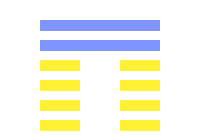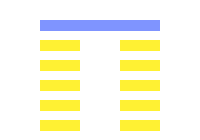20.1.2.3.4.5.6 (20 > 34)

20.1.2.3.4.5.6 (20 > 34) - THE KWÂN HEXAGRAM.
- 1. The first line, divided, shows the looking of a lad ; not blamable in men of inferior rank, but matter for regret in superior men.
- 2. The second line, divided, shows one peeping out from a door. It would be advantageous if it were (merely) the firm correctness of a female.
- 3. The third line, divided, shows one looking at (the course of) his own life, to advance or recede (accordingly).
- 4. The fourth line, divided, shows one contemplating the glory of the kingdom. It will be advantageous for him, being such as he is, (to seek) to be a guest of the king.
- 5. The fifth line, undivided, shows its subject contemplating his own life(-course). A superior man, he will (thus) fall into no error.
- 6. The sixth line, undivided, shows its subject contemplating his character to see if it be indeed that of a superior man. He will not fall into error.
20.1.2.3.4.5.6 (20 > 34) - View
One preaches for a parish that no longer has moral authority.
Bing DeepL Google Yandex20.1.2.3.4.5.6 (20 > 34) - View
One preaches for a parish that no longer has moral authority.
Bing DeepL Google Yandex20.1.2.3.4.5.6 (20 > 34) - Kwèn, la contemplation
Kwèn : 1. Regarder, contempler, regard ; 2. Apparence extérieure, maintien ; 3. Gravité, dignité.
-
1. 1. (Emploi des divers sens de kwēn) : I. Un jeune garçon regardant ; maintien du jeune garçon ; non blâmé chez un homme vulgaire ; digne de blâme chez un Kiun-tze (homme élevé et sage).
C’est la manière de l’homme vulgaire. -
2. Regarder, épier d’une porte entrouverte ; ce qui est bon pour une femme. Mais cela peut attirer la honte.
Regarder une femme, d’une porte ouverte. - 3. Regarder sa propre vie (pour diriger) ses actes (ses allées et venues), (afin de ne pas perdre la voie droite.).
-
4. Venir contempler la majesté de l’empire ; être un heureux hôte du Souverain.
(Se dit d’)un hôte illustre.
Note. Expression consacrée pour dire : faire visite au souverain, en parlant d’un chef féodal. -
5. Contempler sa propre vie. Le Kiun-tze est par là sans reproche.
Regarder le peuple. - 6. Contempler sa vie ; le Kiun-tze est par là sans reproche.
20.1.2.3.4.5.6 (20 > 34) - La vision
On prêche pour une paroisse qui n'a plus d'autorité morale.
Bing DeepL Google Yandex20.1.2.3.4.5.6 (20 > 34) - Tekintet
- 1. Akik ismerik, megértik.
- 2. Tudnia kéne segítenie az övéinek, ahelyett hogy csak nézi őket.
- 3. Tanulni akar.
- 4. Megkéri a legfiatalabbat, hogy ne kövessen el meggondolatlanságot, mielőtt konzultálna a legtapasztaltabbakkal.
- 5. Illetékes személy után néz.
- 6. Nem akarja látni a nehézségeket.
Les trigrammes
Les trigrammes sont des combinaisons de trois traits yin et yang. Dans l'hexagramme, les trois traits du dessous constituent le trigramme inférieur et représentent la situation intérieure. Les trois lignes du haut constituent le trigramme supérieur et représentent la situation extérieure.
Trigramme supérieur : Le vent Le tonnerre


Trigramme inférieur : La terre Le ciel


La formation: 20
What is already there

20 - THE KWÂN HEXAGRAM.
Kwan shows (how he whom it represents should be like) the worshipper who has washed his hands, but not (yet) presented his offerings ;---with sincerity and an appearance of dignity (commanding reverent regard).
Bing DeepL Google Yandex20 - Kwèn, la contemplation
Kwèn : 1. Regarder, contempler, regard ; 2. Apparence extérieure, maintien ; 3. Gravité, dignité.
Texte
Maintien, gravité comme celle de quelqu’un qui est purifié et prêt à offrir le sacrifice et ne fait point l’offrande ; il est plein de droiture, de dignité sévère.
Symbolisme
Vent passant, soufflant sur la terre. Les anciens rois observaient (les caractères) des lieux et du peuple pour établir leur enseignement.
Le grand observateur (figuré par le trigramme du vent) se tient en haut lieu; l’homme bienveillant et conciliant (représenté par le trigramme de la terre) se tient au milieu pour inspecter, contempler le monde.
Commentaire
Les inférieurs le contemplent et se modèlent sur lui. Contemplant la voie spirituelle du ciel et les saisons (se succédant) sans changement, le saint s’y conforme et établit en conséquence son enseignement.

20.1 (20 > 42) - THE KWÂN HEXAGRAM.
The first line, divided, shows the looking of a lad ; not blamable in men of inferior rank, but matter for regret in superior men.
Bing DeepL Google Yandex20.1 (20 > 42) - Regretting too crafty speeches
Those who know can understand.
Bing DeepL Google Yandex20.1 (20 > 42) - Regretting too crafty speeches
Those who know can understand.
Bing DeepL Google Yandex20.1 (20 > 42) - Kwèn, la contemplation
Kwèn : 1. Regarder, contempler, regard ; 2. Apparence extérieure, maintien ; 3. Gravité, dignité.
1. (Emploi des divers sens de kwēn) : I. Un jeune garçon regardant ; maintien du jeune garçon ; non blâmé chez un homme vulgaire ; digne de blâme chez un Kiun-tze (homme élevé et sage).
C’est la manière de l’homme vulgaire.
20.1 (20 > 42) - Regretter les discours trop habiles
Ceux qui savent peuvent comprendre.
Bing DeepL Google Yandex
20.2 (20 > 59) - THE KWÂN HEXAGRAM.
The second line, divided, shows one peeping out from a door. It would be advantageous if it were (merely) the firm correctness of a female.
Bing DeepL Google Yandex20.2 (20 > 59) - Not just sitting back and watch
One should help one's kind rather than looking at them.
Bing DeepL Google Yandex20.2 (20 > 59) - Not just sitting back and watch
One should help one's kind rather than looking at them.
Bing DeepL Google Yandex20.2 (20 > 59) - Kwèn, la contemplation
Kwèn : 1. Regarder, contempler, regard ; 2. Apparence extérieure, maintien ; 3. Gravité, dignité.
Regarder, épier d’une porte entrouverte ; ce qui est bon pour une femme. Mais cela peut attirer la honte.
Regarder une femme, d’une porte ouverte.
20.2 (20 > 59) - Ne pas rester les bras croisés
On devrait aider les siens au lieu de les regarder faire.
Bing DeepL Google Yandex20.2 (20 > 59) - Tekintet
Tudnia kéne segítenie az övéinek, ahelyett hogy csak nézi őket.
Bing DeepL Google Yandex
20.3 (20 > 53) - THE KWÂN HEXAGRAM.
The third line, divided, shows one looking at (the course of) his own life, to advance or recede (accordingly).
Bing DeepL Google Yandex20.3 (20 > 53) - Kwèn, la contemplation
Kwèn : 1. Regarder, contempler, regard ; 2. Apparence extérieure, maintien ; 3. Gravité, dignité.
Regarder sa propre vie (pour diriger) ses actes (ses allées et venues), (afin de ne pas perdre la voie droite.).
Bing DeepL Google Yandex
20.4 (20 > 12) - THE KWÂN HEXAGRAM.
The fourth line, divided, shows one contemplating the glory of the kingdom. It will be advantageous for him, being such as he is, (to seek) to be a guest of the king.
Bing DeepL Google Yandex20.4 (20 > 12) - Taming the impetuosity of the newcomers
One asks the youngest not to be reckless in making decisions without consulting the most experienced.
Bing DeepL Google Yandex20.4 (20 > 12) - Taming the impetuosity of the newcomers
One asks the youngest not to be reckless in making decisions without consulting the most experienced.
Bing DeepL Google Yandex20.4 (20 > 12) - Kwèn, la contemplation
Kwèn : 1. Regarder, contempler, regard ; 2. Apparence extérieure, maintien ; 3. Gravité, dignité.
Venir contempler la majesté de l’empire ; être un heureux hôte du Souverain.
(Se dit d’)un hôte illustre.
Note. Expression consacrée pour dire : faire visite au souverain, en parlant d’un chef féodal.
20.4 (20 > 12) - Dompter l'impétuosité des nouveaux venus
On demande aux plus jeunes de ne pas commettre d'imprudences en prenant des décisions sans consulter les plus expérimentés.
Bing DeepL Google Yandex20.4 (20 > 12) - Tekintet
Megkéri a legfiatalabbat, hogy ne kövessen el meggondolatlanságot, mielőtt konzultálna a legtapasztaltabbakkal.
Bing DeepL Google Yandex
20.5 (20 > 23) - THE KWÂN HEXAGRAM.
The fifth line, undivided, shows its subject contemplating his own life(-course). A superior man, he will (thus) fall into no error.
Bing DeepL Google Yandex20.5 (20 > 23) - Refreshing the memory
One explains to others what they already know.
Bing DeepL Google Yandex20.5 (20 > 23) - Refreshing the memory
One explains to others what they already know.
Bing DeepL Google Yandex20.5 (20 > 23) - Kwèn, la contemplation
Kwèn : 1. Regarder, contempler, regard ; 2. Apparence extérieure, maintien ; 3. Gravité, dignité.
Contempler sa propre vie. Le Kiun-tze est par là sans reproche.
Regarder le peuple.
20.5 (20 > 23) - Rafraîchir la mémoire
On explique aux autres ce qu'ils savent déjà.
Bing DeepL Google Yandex
20.6 (20 > 8) - THE KWÂN HEXAGRAM.
The sixth line, undivided, shows its subject contemplating his character to see if it be indeed that of a superior man. He will not fall into error.
Bing DeepL Google Yandex20.6 (20 > 8) - Taking care of oneself
One doesn't want to see any difficulties.
Bing DeepL Google Yandex20.6 (20 > 8) - Taking care of oneself
One doesn't want to see any difficulties.
Bing DeepL Google Yandex20.6 (20 > 8) - Kwèn, la contemplation
Kwèn : 1. Regarder, contempler, regard ; 2. Apparence extérieure, maintien ; 3. Gravité, dignité.
Contempler sa vie ; le Kiun-tze est par là sans reproche.
Bing DeepL Google Yandex20.6 (20 > 8) - Prendre soin de sa personne
On ne veut voir aucune difficulté.
Bing DeepL Google YandexEn préparation : 34
Ce qui est en passe d'arriver

34 - THE TÂ KWANG HEXAGRAM.
Tâ Kwang indicates that (under the conditions which it symbolises) it will be advantageous to be firm and correct.
Bing DeepL Google Yandex34 - Tá tchuáng, la grande force
Tá tchuáng : grande force
Texte
Elle donne succès et achèvement.
Symbolisme
Le tonnerre au-dessus du ciel représente la plus grande force. Ainsi le sage ne fait pas un pas, un acte contrairement aux règles
Commentaire
Tá tchuáng est le grand devenu fort, le mouvement dirigé par la force ; c’est aussi le fort, juste et droit. La rectitude et la grandeur manifestent les sentiments du ciel et de la terre.
L'hexagramme nucléaire : 23.1.2.3.4.5.6 (23 > 43)
L'hexagramme nucléaire est l'association des deux trigrammes intérieurs (traits 2,3,4 et 3,4,5). Il représente la racine, ou l'origine de la situation.

23.1.2.3.4.5.6 (23 > 43) - THE PO HEXAGRAM
- 1. The first line, divided, shows one overturning the couch by injuring its legs. (The injury will go on to) the destruction of (all) firm correctness, and there will be evil.
- 2. The second line, divided, shows one overthrowing the couch by injuring its frame. (The injury will go on to) the destruction of (all) firm correctness, and there will be evil.
- 3. The third line, divided, shows its subject among the overthrowers; but there will be no error.
- 4. The fourth line, divided, shows its subject having overthrown the couch, and (going to injure) the skin (of him who lies on it). There will be evil.
- 5. The fifth line, divided, shows (its subject leading on the others like) a string of fishes, and (obtaining for them) the favour that lights on the inmates of the palace. There will be advantage in every way.
- 6. The topmost line, undivided, shows its subject (as) a great fruit which has not been eaten. The superior man finds (the people again) as a chariot carrying him. The small men (by their course) overthrow their own dwellings.
23.1.2.3.4.5.6 (23 > 43) - Terrorizing one's subjects
One represses those who seek justice.
Bing DeepL Google Yandex23.1.2.3.4.5.6 (23 > 43) - Terrorizing one's subjects
One represses those who seek justice.
Bing DeepL Google Yandex23.1.2.3.4.5.6 (23 > 43) - Poh, l’écroulement
Poh : opprimer, renverser, traiter durement.
-
1. Poh, « renverser, faire crouler » son lit en en brisant un pied et le détachant ainsi (suites funestes).
C’est le grand, le prince qui se nuit à lui-même en appauvrissant, affaiblissant son peuple. -
2. [i]Id. (Poh)[i], renverser son lit en en brisant la forme ; ruine, issue destructive. C’est celui qui se perd lui-même en perdant ses auxiliaires ; un roi, ses ministres ; un grand, ses employés et amis. (Dicton.)
Il n’aura pas de compagnons.
C’est la ruine s’étendant, gagnant le haut. - 3. Renverser, faire crouler quelque chose sans suite regrettable. C’est quand on le fait légitimement et pour bonnes raisons. C’est que cela atteint également grands et petits (ou abandonne).
-
4. Renverser son lit en s’écorchant, en se nuisant à soi-même, destruction certaine, calamité proche.
Suite de la gradation, en renversant on se blesse -
5. Le prince généreux envers les gens du palais (litt.(/i] : qui enfile des poissons pour en faire présent), en retirera des avantages certains.
Peut-être devrait-on admettre déjà ici l’élément figuratif et symbolique, et voir dans l’hexagramme la figure du prince (ligne pleine supérieure) au-dessus de ses officiers rangés comme des poissons séchés et traduire : avoir des officiers comme des poissons enfilés. Alors, il s’agirait de [i]p’o, gens du palais. -
6. Fruit tout formé qu’on ne mange pas (bien acquis qui se détruit). Le sage, l’homme supérieur conquiert la terre (ou acquiert un char, le peuple qui le porte sur ses bras) ; l’homme bas et vulgaire fait crouler (poh) jusqu’à sa demeure (le fruit formé qu’il ne peut manger).
Il ne pourra plus en user.
23.1.2.3.4.5.6 (23 > 43) - Terroriser ses sujets
On réprime ceux qui demandent justice.
Bing DeepL Google Yandex23.1.2.3.4.5.6 (23 > 43) - Lepusztulás
- 1. Nem látja mit veszít.
- 2. Támasz, amire nem lehet számítani többé.
- 3. Nem törődik a többiekkel többé.
- 4. Nem akar elviselni többé.
- 5. Látja mi nem működik.
- 6. Elfogadja a veszteséget. Támogatást és lehetőséget kap.
Guide
La situation de départ

20.6 (20 > 8) - THE KWÂN HEXAGRAM.
The sixth line, undivided, shows its subject contemplating his character to see if it be indeed that of a superior man. He will not fall into error.
Bing DeepL Google Yandex20.6 (20 > 8) - Taking care of oneself
One doesn't want to see any difficulties.
Bing DeepL Google Yandex20.6 (20 > 8) - Taking care of oneself
One doesn't want to see any difficulties.
Bing DeepL Google Yandex20.6 (20 > 8) - Kwèn, la contemplation
Kwèn : 1. Regarder, contempler, regard ; 2. Apparence extérieure, maintien ; 3. Gravité, dignité.
Contempler sa vie ; le Kiun-tze est par là sans reproche.
Bing DeepL Google Yandex20.6 (20 > 8) - Prendre soin de sa personne
On ne veut voir aucune difficulté.
Bing DeepL Google YandexCorrection
La direction suivant laquelle le guide va plier

20.1.2.3.4.5 (20 > 14) - THE KWÂN HEXAGRAM.
- 1. The first line, divided, shows the looking of a lad ; not blamable in men of inferior rank, but matter for regret in superior men.
- 2. The second line, divided, shows one peeping out from a door. It would be advantageous if it were (merely) the firm correctness of a female.
- 3. The third line, divided, shows one looking at (the course of) his own life, to advance or recede (accordingly).
- 4. The fourth line, divided, shows one contemplating the glory of the kingdom. It will be advantageous for him, being such as he is, (to seek) to be a guest of the king.
- 5. The fifth line, undivided, shows its subject contemplating his own life(-course). A superior man, he will (thus) fall into no error.
20.1.2.3.4.5 (20 > 14) - View
One recognizes those who deliver because they do not appear regularly.
Bing DeepL Google Yandex20.1.2.3.4.5 (20 > 14) - View
One recognizes those who deliver because they do not appear regularly.
Bing DeepL Google Yandex20.1.2.3.4.5 (20 > 14) - Kwèn, la contemplation
Kwèn : 1. Regarder, contempler, regard ; 2. Apparence extérieure, maintien ; 3. Gravité, dignité.
-
1. 1. (Emploi des divers sens de kwēn) : I. Un jeune garçon regardant ; maintien du jeune garçon ; non blâmé chez un homme vulgaire ; digne de blâme chez un Kiun-tze (homme élevé et sage).
C’est la manière de l’homme vulgaire. -
2. Regarder, épier d’une porte entrouverte ; ce qui est bon pour une femme. Mais cela peut attirer la honte.
Regarder une femme, d’une porte ouverte. - 3. Regarder sa propre vie (pour diriger) ses actes (ses allées et venues), (afin de ne pas perdre la voie droite.).
-
4. Venir contempler la majesté de l’empire ; être un heureux hôte du Souverain.
(Se dit d’)un hôte illustre.
Note. Expression consacrée pour dire : faire visite au souverain, en parlant d’un chef féodal. -
5. Contempler sa propre vie. Le Kiun-tze est par là sans reproche.
Regarder le peuple.
20.1.2.3.4.5 (20 > 14) - La vision
On reconnaît ceux qui livrent car ils n'apparaissent pas de façon régulière.
Bing DeepL Google Yandex20.1.2.3.4.5 (20 > 14) - Tekintet
- 1. Akik ismerik, megértik.
- 2. Tudnia kéne segítenie az övéinek, ahelyett hogy csak nézi őket.
- 3. Tanulni akar.
- 4. Megkéri a legfiatalabbat, hogy ne kövessen el meggondolatlanságot, mielőtt konzultálna a legtapasztaltabbakkal.
- 5. Illetékes személy után néz.
Forum
Avez-vous besoin d'aide pour comprendre ce tirage ?
Rejoignez le forum et demandez de l'aide.
BBCode
Le BBCode ci-dessous est à votre disposition pour être copié-collé dans votre fil de discussion.
Link
Lien vers ce tirage

